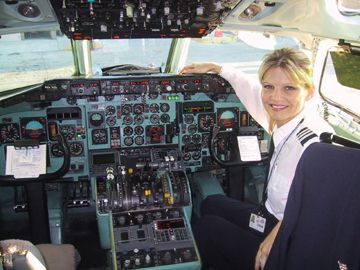
When speaking of airline pilots, you might immediately think of long flights that take you halfway or even around the world in hours. Airline pilots could be flying cargo or passengers.
Airline Pilots are paid in relation to the aircraft they are flying. A pilot flying jet aircraft would earn more than one who flies turboprops. They would earn upward of $100,000, depending on company policies.
Airline pilots have the advantage of a staff working together and behind them. They are generally not involved with any administrative aspects of flying. Most national carriers look for pilots with years of experience and an accident-free record. So pilots start off with commuter and/or domestic companies, acquire the required qualifications, and then move on to better jobs.
In some countries, it is mandatory for all civilians to serve with the Armed Forces for a certain duration. Here, one finds most pilots get their basic flying training; they are then able to take up commercial flying once they leave. From this platform, a pilot can branch out as per preference, fitness, etc. The other options for a pilot are charter flying, air-taxis, crop-dusting, flying doctors, search and rescue, etc.
To be a pilot, an individual needs a commercial pilot's license or certificate and flying experience. A pilot has to be eighteen years old and have good health, no physical handicaps, and 20/20 vision with or without glasses. First is the basic training, where a potential pilot learns the basics. This is followed by flying with an instructor, who puts you through various situations to help you to cope with emergencies, flies with you for 250 hours, and teaches the instrument rating--the ability to fly using instruments--and the multi-engine rating--the ability to fly aircraft with two or more engines. One needs to be fairly proficient with math and science, as progress in technology demands certain levels of technical expertise from its pilots. Civilian training is expensive, but it is an investment that pays rich dividends.
This profession is fascinating, and it never fails to delight those who actually fly the airplane. It is equally fascinating to the observer, who has high regard for the pilot's ability to take responsibility for so many lives and a multi-million-dollar piece of equipment.
Pilot Training [http://www.WetPluto.com/Airline-Pilot-Training.html] provides detailed information on Pilot Training, Helicopter Pilot Training, Airline Pilot Training, Commercial Pilot Training and more. Pilot Training is affiliated with Military Planes [http://www.Planes-web.com].
No comments:
Post a Comment